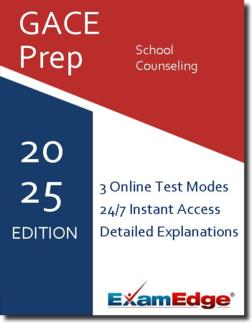GACE School Counseling (103/104/603) Practice Tests & Test Prep by Exam Edge - Blogs
Based on 28 Reviews
- Real Exam Simulation: Timed questions and matching content build comfort for your GACE School Counseling test day.
- Instant, 24/7 Access: Web-based GACE School Counseling practice exams with no software needed.
- Clear Explanations: Step-by-step answers and explanations for your GACE exam to strengthen understanding.
- Boosted Confidence: Reduces anxiety and improves test-taking skills to ace your GACE School Counseling (103/104/603).



